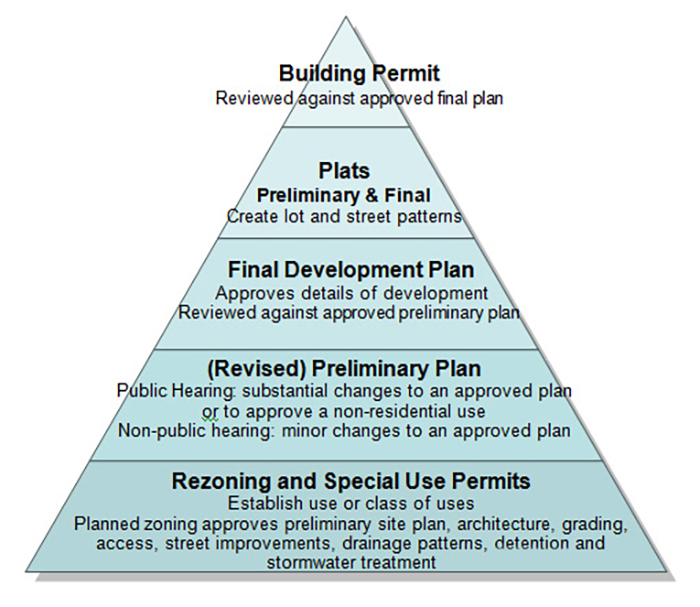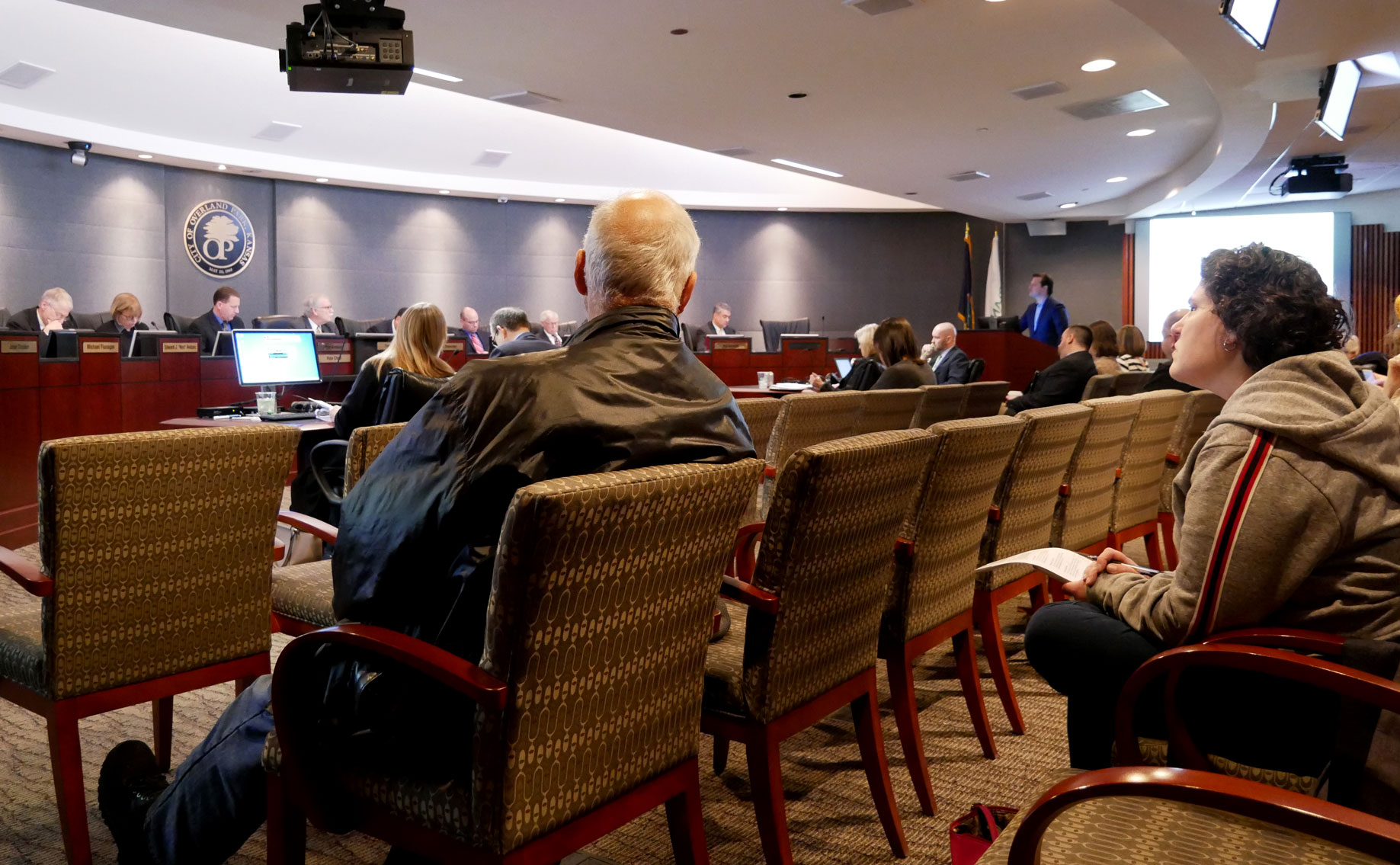Development Review Process
Development Review Process
The city’s current planning staff review and coordinate development applications.
The development review process begins with a pre-application conference between the applicant and staff, and concludes with a final recommendation from the Planning Commission or City Council.
Staff review includes the placement, type, intensity, and density of uses, access, traffic impacts, stormwater management, building design and landscaping.
The Unified Development Ordinance, the Comprehensive Plan and the design guidelines and standards are all tools used to ensure that proposed development meets the requirements and expectations of the city.
Planner of the Day
pod@opkansas.org
913-895-6217
Types of Development Applications
The development pyramid illustrates how the various types of development applications considered by the Planning Commission and City Council relate to each other and to the building permit review process. Additional details about a development are required with each subsequent application.
Most developments begin at the bottom of the pyramid and work their way through all the stages in the pyramid before building permits are issued.

- Rezoning
- Special Use Permits
- Preliminary Development Plans
- Final Development Plans
- Plats
- Building Permits
Development Review Criteria
The Unified Development Ordinance establishes criteria for review of development applications. Criteria for review are different depending on the type of application.
To learn about what criteria staff and the Planning Commission will use to review a particular application, open the accordion for each respective application type below.
- Rezoning + Special Use Permits
- Revised Preliminary Development Plans

Participating in the Development Review Process
Public hearings give residents and applicants an opportunity to address the Planning Commission or City Council prior to decisions on proposed developments.
All rezoning and special use permit and some preliminary plan requests require a public hearing. The Planning Commission agenda will indicate when a public hearing is required for an item.
Share your comments on a development by:
- Sending an email to the Planning Commission
- Testify in person at the public hearing
- Testify through a representative at the public hearing
- Contacting your City Council member
Speaking at a Public Hearing
The Governing Body welcomes resident and public feedback about development proposals that are open for public comment.
When speaking at a public hearing, the following suggestions will help Planning Commissioners or City Council take your public comment into full consideration.
- Familiarize yourself with the application by visiting with the planner assigned to the case, attending any
scheduled neighborhood meetings and reading the staff comments. - Be familiar with the criteria used to make land use decisions. Present well-reasoned arguments based on these criteria. Decision makers can only consider relevant testimony.
- Keep your comments clear and concise.
- Avoid repeating comments made by others. Organize with others who have the same concerns and explain to the Planning Commission that one person speaks on behalf of your group.
In order to ensure that all interested parties have an opportunity to speak, the Chair person may limit the time for each speaker. If you represent a large group of residents or need other accommodations, please let the project’s case manager know in advance.
Council Chamber Technology
The City Council Chamber has technology for speakers with presentations. This technology includes:
- A podium with touch-panel display and presentation annotation tools.
- A Windows computer with all Microsoft Office applications installed.
- High-speed internet access.
- DVD, CD and VHS players.
- An external card reader with hub that can read a wide range of storange devices including USB drives, compact flash cards, SD cards, and memory sticks.
- An overhead projector with a document camera for letter size or smaller documents and objects.
- A ceiling-mounted document camera used for the projection of large format plans
or large objects.
Protest Petitions
Property owners adjacent to proposed developments can file protest petitions for pending rezoning, preliminary plan, and special use permit applications requiring a public hearing.
Valid protest petitions impact the approval requirements for an application.
Valid Protest Petitions
A protest petition is valid if 20 percent of the land area within the notification ring is represented by the signatures of the property owners. Property owners signing the petition must:
- Live within the notification ring, generally 200 feet from the boundary of the request.
- Sign their full names as they appear on the deed to the property recorded in the Johnson County office of the Register of Deeds.
For additional requirements, see the instructions included with the protest petition form.
The petition may be filed with the City Clerk’s Office beginning the day after the Planning Commission makes a final recommendation on the item but no later than by the end of business 14 days after.
Effects of Protest Petitions
Rezoning, Special Use Permits, Preliminary Development Plans, and Revised Preliminary Development Plans
If a valid protest petition is submitted for any of these applications, ten of 12 City Council members must approve the application during a City Council meeting.
Without the protest, only seven votes in favor of the application are required.
Preliminary Development Plans for Non-Residential Uses in a Residential District
These protest petitions are for buildings, schools, religious institutions, and similar non-residential uses. Unless a valid protest petition is submitted for non-residential applications within a residential district, the action of the Planning Commission is final.
When a valid protest petition is filed, the application must be approved by seven of 12 City Council members.
Protest Petition Documents
- Preliminary Development Plan Protest Petition – Nonresidential Use
- Protest Petition for Preliminary Development Plan, Rezoning and Special Use
Contact the Current Planning Division at 913-895-6217 for detailed information about the protest petition process.
You also may wish to contact a private attorney to ensure your petition is completed correctly.
Development News
Residents can learn about development proposals a number of ways.
In-Person
There are many options to stay aware of development proposals near your home or business.
In some cases, residents living near proposed developments will receive postcards from the city and a certified letter from the applicant informing them of potential changes.
Notices of public hearing are also posted on the properties themselves.
Online
We share information about new proposals and Planning Commission agenda highlights on the city’s social media channels. Or, sign up for e-newsletters.
Development Proposal Map
Search the map to see proposals that could be coming to your neighborhood. Or, browse around and see what’s new.
